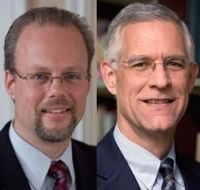Why Full Confidence?
October 15, 2010

Westminster Professors Rev. Dr. David Garner (Associate Professor of Systematic Theology) and Rev. Dr. Scott Oliphint (Professor of Apologetics) were recently interviewed by Mel Duncan on the radio program "Knowing the Truth," based in Greenville, SC. The show answered questions about what it means to have "Full Confidence" in the Scriptures, and looked ahead to the Full Confidence Conference in Greenville, Nov. 19-20.
Click Here to hear the interview.
For More information on the Full Confidence Conference Series, Click Here.
Dr. Garner:
"At the very base, we want to help people when they put their heads on their pillows at night to be able to lay their heads down with a confidence that they know that in God’s Word they can truly trust completely. And it is a lie, frankly, that the Bible can’t be trusted, it is truly the very word of God and it is worthy of our, as this conference has put it, “full confidence.” So, the goal is to reaffirm and to encourage God’s people to reaffirm their confidence in the Word of God. The themes that are being addressed are themes that are about the nature of Scripture, the notion of perspicuity, or the clarity of Scripture. That’s an issue that many in the scholarly world look at the Bible and say “it’s an absolute mess, how can we make any sense of it?” Frankly, it is the messy work of these scholars that leads to these conclusions; it is not the Bible itself. We want to encourage people that they can read their Bible and truly have confidence that God has spoken and that he has spoken clearly. There are issues of interpretation, there are issues of “What does it mean that the Scripture is the Very Word of God? What are the implications of it as a divine book communicating to us?” Well the implications are that it is sufficient, it is necessary, it provides us what we need for life and godliness and we want to reaffirm those things for God’s people.
Dr. Oliphint:
"When we begin to talk about reformed theology, one of the things that we recognize, back to Calvin actually and beyond, is the self-attestation of scripture, which is a fancy way of saying that scripture carries its own authority within it. Because it is God’s Word, it carries God’s power. Because Scripture is self-attesting, and because it carries God’s power, that has significant implications in the use of Scripture and the truth of scripture in defending the Christian faith. It’s my own conviction, as one who was converted as an evangelical and only later became reformed in my theology, that without a reformed understanding of Scripture evangelicalism is going to falter when it comes to a strong view of what the Bible is."







